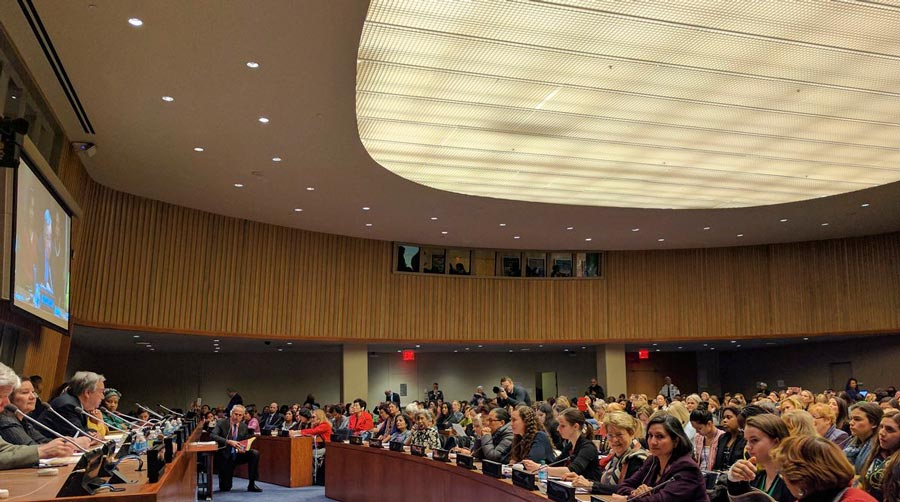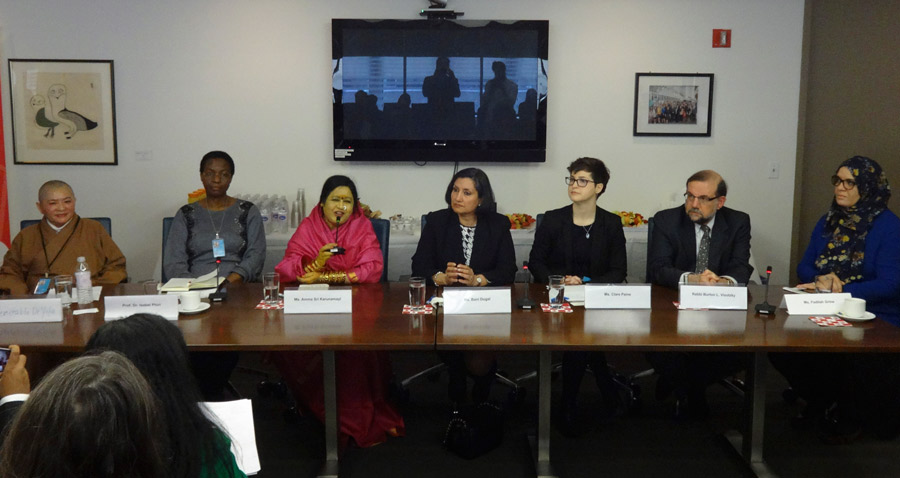The United Nations Commission on the Status of Women met in New York recently, and the Baha’i International Community joined in—and weighed in.
“The discussions at the UN raised fundamental questions about how the situation of millions of women around the world—economic, social, and otherwise—can best be improved,” said Saphira Rameshfar, a representative of the Baha’i International Community (BIC) to the United Nations.

The BIC contributed to the discourse on the advancement of women during the UN Commission on the Status of Women this year.
The Commission on the Status of Women—the single largest forum for UN Member States and other international actors—focuses on women’s rights and empowerment around the world. Every year, it attracts thousands of participants from every corner of the globe.
The theme of this year’s Commission, running from 13–24 March 2017, was “Women’s Economic Empowerment in the Changing World of Work:”
“Economic empowerment cannot be equated with women simply occupying the same positions as men within the existing social order—an order that has generated tremendous disparities of wealth and resources, treated the natural environment as a reservoir of resources to be exploited at will, and prioritized economic growth over other vital concerns such as the health of families, the stability of communities, and indeed the psychological and emotional well-being of workers themselves,” Ms. Rameshfar said.
Instead, the BIC proposed that women would need to have an integral and critical role in establishing new patterns of thought and behavior and new social structures that reflect the principle of the equality of women and men and the oneness of humankind.

At the discussion hosted by the BIC to present its statement, panellists from several prominent NGOs joined Bani Dugal, Principal Representative of BIC to the UN (center), in a panel discussion on the economic structure of society, the role of the family, and the period of youth as they relate to gender equality.
The BIC contributed in many forums, including by sharing its statement, “Toward Prosperity: The Role of Women and Men in Building a Flourishing World Civilization,” with the Commission; screening the film Mercy’s Blessing; hosting an event to explore faith and feminism; and conducting a discussion to examine the role of youth in gender equality, among others.
At the discussion hosted by the BIC to present its statement, panelists from several prominent NGOs offered their reflections on the economic structure of society, the role of the family, and the period of youth as they relate to gender equality.
Religion contributes to cultural norms for the economic empowerment of women, said Azza Karam, Senior Advisor to the Multilateral Affairs Branch of the UN Population Fund (UNFPA) and member of the panel. “People think this area is just a small domain of the global conversation about human rights,” she said. “But it is essential to realizing the (UN’s) sustainable development goals.”
At the Commission’s Youth Forum, which convened more than 700 young people from around the world, BIC collaborator Eric Farr suggested that one way faith communities can contribute to gender equity is by adopting a systematic process of learning.
“We actually don’t know what a society that’s truly based on principles of gender equality looks like; such a society has never existed,” said Mr. Farr. He continued by explaining that the equality of women and men is an ideal toward which we, as one human family, must work. Humanity’s efforts will require an ongoing process of dialogue and learning. “What we need is to develop a new body of knowledge that draws on the insights of humanity’s great systems of knowledge, religion and science,” he concluded.
Commenting on the significance of this international discourse to the Baha’i community, Bani Dugal, Principal Representative of the BIC to the UN, said “The Baha’i Faith explicitly states that the equality of women and men is not merely desired, but an eternal spiritual truth essential to humanity’s advancement and the establishment of peace:”
… there must be an equality of rights between men and women. Women shall receive an equal privilege of education. This will enable them to qualify and progress in all degrees of occupation and accomplishment. For the world of humanity possesses two wings: man and woman. If one wing remains incapable and defective, it will restrict the power of the other, and full flight will be impossible. Therefore, the completeness and perfection of the human world are dependent upon the equal development of these two wings. – Abdu’l-Baha, The Promulgation of Universal Peace, p. 317.
















Comments
Sign in or create an account
Continue with Googleor